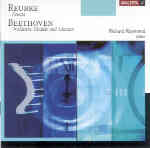Had Julius Reubke (1834-58) not died at 24, you wonder how this tremendously gifted composer would have developed. His two large-scale works, the organ sonata and the present piano sonata are indebted to his teacher Franz Liszt’s B minor sonata, yet their cyclical structure looks ahead to Cesar Franck’s restless modulations. The sonata’s keyboard writing gushes forth with idiomatic assurance and dynamic flair. Richard Raymond’s clean and controlled pianism makes a beautiful impression throughout, although you might want more pulverizing abandon in the first movement’s triplet octaves and trills, plus greater scintillation and dynamic contrast elsewhere. Unfortunately, my reference version–Till Fellner’s marvelous 1996 Erato recording–is out of print, but Claudius Transki on MDG provides a solid alternative, along with Martin Sander’s fine performance of the organ sonata.
Unfortunately, Raymond’s Waldstein is disfigured by restricted dynamics along with unnatural-sounding ritards and elongations that impede the first movement’s galvanic momentum. The introduction leading into the Rondo is judiciously timed, but the little rhetorical pauses in the Rondo’s main theme are not. Moreover, Raymond’s accomplished yet picky pianism lacks the rhythmic sweep and dramatic ardor that distinguish the catalog’s finest Waldsteins, including Schnabel, Solomon, Gilels, Kuerti, Goode, Kovacevich, and (my favorite) Hungerford. In sum, this is recommended for the Reubke.
































